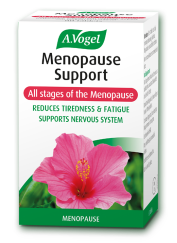An introduction to breast pain and menopause
Around 70% of women are said to experience breast pain at some point in their life. This symptom is often associated with PMS (Pre-menstrual syndrome) but may also be experienced by menopausal women during the stage of peri-menopause when big hormonal changes are starting to take place. Breast pain is described as a feeling of tenderness, swelling and discomfort or heaviness of the breasts.
Two main types of breast pain are experienced at around the time of menopause:
- Cyclical breast pain is associated with the menstrual cycle and tends to come a week or so before the period begins. It is a PMS-type symptom affecting women during the peri-menopause or before periods stop
- Non-cyclical breast pain has no relation to the menstrual cycle but can come at any time. This can occur before, during or after the menopause.
While some women experience breast pain much later in life, in the majority of cases, breast pain settles down shortly after the menopause or when periods stop.
Why does menopause cause breast pain?
Breast pain in women is most often associated with hormonal changes and imbalances, although the exact reason is unclear.
During the hormonal fluctuations of the peri-menopause and menopause, breasts can increase in size. This occurs when the level of the hormone progesterone increases while oestrogen decreases. The result can be pain and tenderness.
Diet, lifestyle and home remedies for breast pain
There are certain measures which can help relieve the worrying symptoms of breast pain. It is worth putting some effort into easing the symptom, as this will aid your morale, general health and comfort.
- Smoking can have an adverse effect on your body at the best of times, not least during the menopause. Smoking can prevent the body from adapting to the hormonal changes experienced during the menopause. It also increases the likelihood of breast cancer
- Diet is important. Food with plenty of vitamins keeps the body healthy, and vitamins B and E particularly can help ease breast pain. Making sure you have enough fibre in your diet will help your body balance out oestrogen levels
- Consuming stimulants such as caffeine can have an unwanted effect on breasts. This is because these dilate (widen) the blood vessels throughout the body, including those in the breasts, leading to swelling and pain
- Make sure that your bras fit correctly as an ill-fitting one can lead to pain or even breast tissue damage. It is important to get measured regularly as your breast size and shape can change quickly.
Are there herbal remedies to help me?
If your breast symptoms are mild and accompanied by other signs of the menopause, start off with a soy supplement made from fermented soya beans. This is a great general supplement for women going through the menopause.
![]() "This has worked for me I was always very active and suddenly found myself tired and a lot of aches this has now gone I also take the sage tablets and they are excellent."
"This has worked for me I was always very active and suddenly found myself tired and a lot of aches this has now gone I also take the sage tablets and they are excellent."![]()
If you are still having periods and the breast pain you experience coincides with your monthly cycle, use Agnus castus, a remedy specific for PMS and breast tenderness.
What about conventional medicine?
If you are looking for a conventional treatment to help with your menopause symptom, then it may be worth talking to your doctor. A range of treatments is available, although not all will be appropriate for you.
If your condition is severe or affecting your lifestyle, your doctor may recommend that you consider the use of HRT. However, this is associated with risks and side effects which your doctor will discuss with you.
It is important to seek medical advice if you are concerned about your breast pain, particularly if your nipples are affected, showing a discharge or bleeding, or if you feel a lump in your breast.








